
Thrive LDN x Living Proof Bereavement Project Insight Partner Report
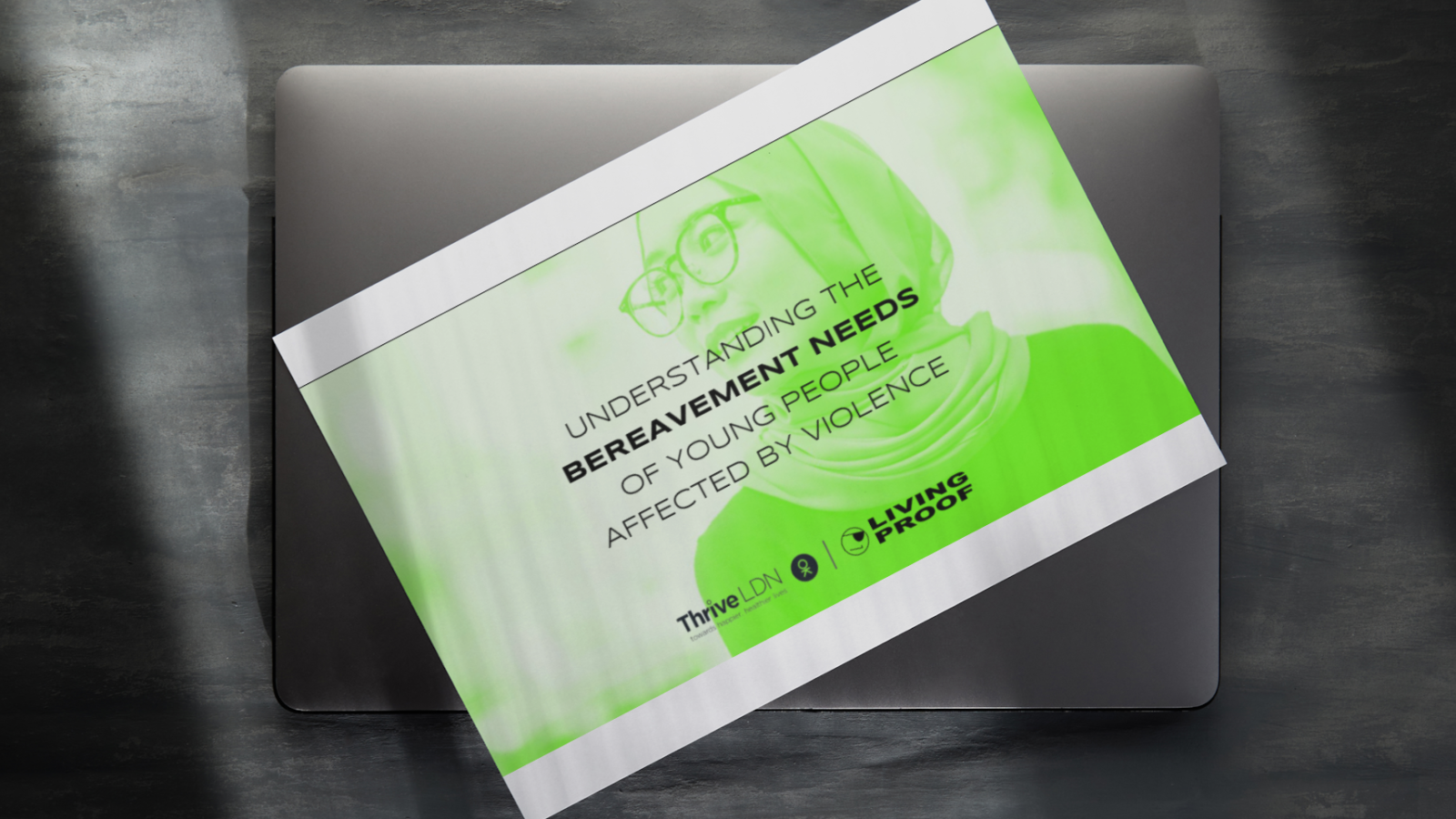
Report
Updated: 06/12/2023
Context
In 2022, the Bereavement Commission undertook a review of bereavement services across the UK with the final report concluding that not enough is being done to support the bereaved.
Many of the recommendations in this report align with findings from the GLA commissioned review of bereavement services in 2021 by Cruse Bereavement Support which acknowledged that:
-
Further investment was required to meet growing need and prevent complex grief.
-
There was a specific need to grow public awareness across communities and individuals.
-
Provision across London boroughs was varied, with only a small number of Black, Asian and racialised as minorities bereavement services available in only 15 boroughs.
-
Further research and attention were required for Children and Young People’s bereavement.
-
There was a gap in provision for under-8 year olds – a group where we need to consider the language used to describe death and loss.
Since 2012/13, there has been an increase in youth violence in the UK. In 2021, London recorded the highest number of teenage deaths (14–19-year-olds) by knife or guns, equating to 74.4% of all homicides, an increase of 15.6% from 2020. With the pressure and stress of the cost of living and climate crisis, there is a risk of violence and deaths by violence rising still further.
Serious violence is costly for society, costing the NHS £2.9 billion alone, which in the current cost of living crisis puts more pressure on healthcare and other organisations. Moreover, the mental health impact it has on individuals, families and wider communities, can continue the cycle of violence and increase experiences of trauma, particularly in adolescents.
The prevalence of complicated grief as a result of bereavement through violent death, can have lasting effects as family and friends struggle to make sense of the loss. The need for specific bereavement support, wider social support and training is essential to managing bereavement for Londoners.
Working in partnership with the GLA, Thrive LDN was tasked with scoping opportunities to address the specific bereavement needs of those affected by violence. As part of this scoping exercise, Thrive LDN wanted to hear from young people about their experiences of bereavement support services and their recommendations for improvement.
Executive Summary
This work has been commissioned by Thrive LDN in partnership with LIVING PROOF and funded and supported by the Mayor of London’s Violence Reduction Unit and the Greater London Authority (GLA).
The youth consultancy LIVING PROOF has designed and run the research and recruitment for this project and produced this report.
Author: Miriam King (LIVING PROOF)
Funded by: The Mayor of London
________
The purpose of this project was to deepen our understanding of current needs by engaging with young people who have experienced and been affected by bereavement through violence, in order to help shape future programmes of work.
To carry out the research, we engaged with 22 young Londoners that have experienced bereavement through violence. We sought to understand their experiences of bereavement, their experiences of support services and recommendations for how services can be improved for all young Londoners bereaved through violence.
This report details their voices, their experiences and their recommendations for change.
Key findings
1. Experiences of bereavement
- Young people experienced varying levels of support in the time shortly after their bereavement with only 25% accessing formal support services.
- Informal support through friends and family and formal support services through school/college were the most common places that young people found support.
- Young people think that the responsibility for bereavement support should be with Local Authorities.
2. Experiences of services
Five key barriers were identified in young people being able to access support services:
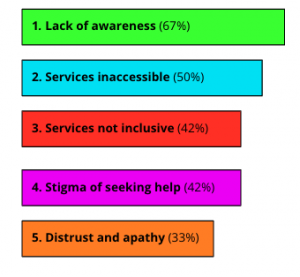
3. Opportunity areas
From the barriers to accessing services, four opportunity areas for change were identified:
- Increase awareness of bereavement services available to young people
- Ensure bereavement services are accessible to all young people
- Ensure bereavement services are inclusive, flexible and adaptable
- Ensure services are fit for young people as they should not have to fit themselves into existing services that are unsuitable
Recommendations
Increase awareness of bereavement services available to young people
- Promote services through posters and leaflet drops in places where young people are, such as youth clubs, local libraries, faith groups, schools, colleges and universities
- Promote services on social media where there’s a youth audience, in particular Instagram and TikTok
- Run advertising campaigns on social platforms such as YouTube, TikTok and Instagram
- Work with ambassadors to increase awareness of and engagement with services. An example of best practice is the success of Marcus Rashford’s free school meals campaign
Ensure bereavement services are accessible to all young people
- Diversify assessments to ensure a thorough understanding of the young person’s background and context is considered when deciding on service options for them
- Provide options and choice for young people to ensure they can find support that works for them
- Advocate for young people to ensure they are fast tracked and avoid long waiting lists
- If long waiting lists are unavoidable, ensure there is an interim solution put in place to support that young person
- Provide actual safe spaces where information isn’t shared, unless for safeguarding reasons
Ensure bereavement services are inclusive, flexible and adaptable
- Co- design services with young people to ensure they aren’t just an altered version of adults services that don’t serve their needs
- Take a creative approach to services to ensure young people aren’t just offered talking therapy
- Provide young people with the option to engage in group activities with their peers as well as one to one support
- Build a support network around each young person so they don’t feel alone
Ensure services are fit for young people as they should not have to fit themselves into existing services that are unsuitable
- Empower communities to support each other through engagement, collaboration and training
- Respect cultural norms and understand cultural nuance by providing practitioners with cultural competency training and investing in diversifying the profession
- Match each young person to a practitioner that they feel comfortable with and understands them, giving them the choice to change if they want to
- Provide young people with a mentor that they trust and can lean on for support
Methodology
Recruitment
We worked with Thrive LDN to recruit young Londoners with lived experience of bereavement through violence across a diverse range of demographics and boroughs. We recruited twelve young people for one to one interviews and ten young people for an ideas co-creation workshop.
Research
We carried out twelve forty minute one to one interviews with young Londoners to understand their personal experiences of bereavement through violence and also their experiences of support services.
Using the insights from the interviews as a jumping off point, we then facilitated a two hour creative workshop with ten young people who have been bereaved through violence to co- create ideas for how bereavement services can be improved to better support young people.
Ethics
Throughout this project, LIVING PROOF and Thrive LDN worked to ensure our process was equitable by:
-
Paying participants for their time
-
Reimbursing participants travel expenses
-
Offering in person, virtual or telephone-based one to one interviews
-
Understanding that people are experts of their lived experience and how it can be improved
-
Being clear on the objectives of the work so the young people were equal stakeholders
-
Being clear about our safeguarding policy during all interviews and workshops to ensure participant safety
-
Signposting participants to resources if needed
Please note: all names have been changed in this report to protect the identity of the young people that took part in interviews.
One: Experiences of bereavement
“It normalised death in a numbing way.
It made me extremely fearful for my brother
and my male friends around me”
Impact on young people's lives
How did the bereavement impact your life?
The young people we spoke to described various ways in which their lives were affected by their loss, ranging from feelings of anger and guilt through to detachment, desensitisation and normalisation.
What’s clear is that for many, the effects are still being felt in their lives today. This led us to identify both short and long term ways in which bereavement has impacted their lives.
Short-term impacts
Felt alone with no one to talk to
“I was devastated. I remember the specific day, I came home. I couldn’t process it at all at that time of my life” Khalil, bereaved age 14
Felt scared and anxious
“It made me extremely fearful for my brother and my male friends around me. I was constantly worried and afraid that I could lose them at any given moment” Eunice, bereaved age 13
Became detached from the people in their lives
“I became very detached from everyone and found it hard to communicate” Layla, bereaved age 17
Inability to focus at school, college or work
“It happened in summer, so I wasn’t in school. It impacted work and I couldn’t go” Rebecca, bereaved age 16
Long-term impacts
Violence became normalised
“Growing up in this area, in a council flat in [Lambeth], lots of close friends have passed away” Sofia, bereaved age 21
Feelings of guilt
“Guilt is something I struggle with, ‘why didn’t I reach out? Why didn’t I hang out with him more?’ It still impacts the friendships I have today, ‘am I spending enough time with them?’” Sarah, bereaved age 12
Wanting to impact change and ‘do something about it’
“I joined Advocacy Academy at age 17 – worked on raising awareness of knife crime. I spoke about it in a detached way” Nadia, bereaved age 11
Looking at life differently
“It taught me that looking at someone the wrong way can instigate something” Amit, bereaved age 19
Support young people received
Did you feel supported?
Although many of the young people found some support in a number of ways, predominantly through family and friends, there was an overarching sense that they didn’t receive enough support to help them through the initial, most difficult part of the grieving process.
A number of the young people interviewed noted that they didn’t feel supported at all at the time.
“I didn’t feel like I could have a feeling, I was just watching what the adults were doing and thinking let me just be a good child” Nadia, bereaved age 11
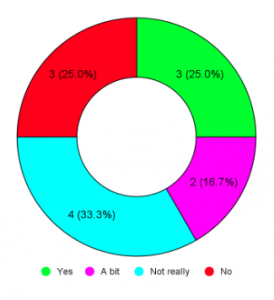
Who did you feel supported by at the time?
Friends
“We were all in the same boat, we were all friends with that person. We were our own support system. We played football together” Khalil, bereaved age 14
“Friends that also knew him – we were there for each other” Sofia, bereaved age 21
“It made us closer as a friendship group” Amit, bereaved age 19
Family
“I was supported by my family who had learned what had happened” Ahmad, bereaved age 18
“My mum was there – I feel like she felt his mother’s pain” Sarah, bereaved age 12
“My older brother was subjected to a knife crime and he gave me advice” Amit, bereaved age 19
School/college
“They gave me a 6th form mentor who had been through something similar. I saw her weekly, it was nice hearing from someone who had been through a similar situation” Jade, bereaved age 12
Whose responsibility is it to support young people bereaved through violence?
“Having a way of unifying it all – one support network”
During the workshop, we asked the young people who they think should be responsible for supporting them through their bereavement.
Local authorities came out on top with specific departments such as child support services being mentioned. Local health services were also mentioned including GPs and mental health service providers.
Ultimately the group imagined a world where all institutions and people involved in the young person’s life are connected to provide them with wrap around support in all areas of their lives.
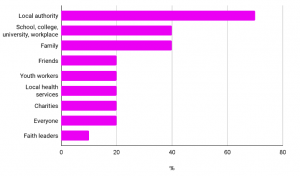
Two: Experiences of services
“Other than the counselling I had in 2020, which helped a lot especially because it was also during lockdown,
I didn’t feel supported with the other deaths”
Young people's experiences of services
Were you offered or did you seek out any formal support services during the time shortly after your bereavement?
Of the twelve young people interviewed as part of this research, only four were engaged with formal support services during the time shortly after their bereavement.
Of the four young people that received support, only one was offered bereavement specific support.
On the following page we highlight Usman’s story of accessing support services in the time shortly after his loss.
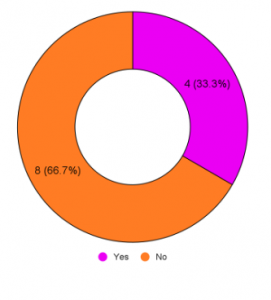
Ahmad
Ahmad received support from his local authority due to an existing relationship with the team that support young people with additional needs. They approached him sensitively to discuss his needs and offered him one to one support to explore his interests, meeting one to two times per week.
“It made me feel a bit relieved knowing that there were people who were willing to come in and offer help and a lending hand”
Mia
Whilst aware that they didn’t specialise in bereavement support, Mia received counselling through school on a weekly basis shortly after her loss. A nurse in the hospital suggested she might want to speak to someone. The support provided her with tools, techniques and listening time to help her process her grief and she felt that her counsellor understood her from a professional standpoint.
Sarah
In 2017, Sarah received counselling support through school on a weekly basis. However, this wasn’t bereavement specific support as she had an existing relationship with the school counselling service due to domestic abuse issues at home.
Case Study
Usman’s experience of support services
Usman, 25, was born in Sri Lanka and grew up in the middle of the civil war there. At age 8, he came to the UK as a refugee with his mother and sister, his father due to follow them a few months later.
Shortly after arriving in the UK, Usman and his family received the news that his father had been violently killed as a result of the war.
“I was completely shocked and devastated. I didn’t want to talk to anyone. I shut myself out from talking to my mother and sister – they were my only family in the UK. I would go to school and didn’t talk to anyone.”
Accessing support services
Usman’s mother told his headteacher what had happened, leading to Usman receiving bereavement counselling through his school.
Usman started seeing a bereavement counsellor once a week for an hour or two to talk about his feelings and help him express his emotions, stating “it was a safe space to talk about how I felt. It was good to speak to someone not in my family.”
As Usman didn’t have very good english at the time, his counsellor facilitated numerous picture based activities to encourage participation.
“She would show five different faces and ask me ‘which are you? How do you feel?’ There were lots of tears at the beginning, it was very hard.”
Overall, Usman’s experience of bereavement counselling was very positive, noting that his counsellor was “empathetic, supportive, like a mother figure”. Other important traits he highlighted included her tone of voice, her expressions, and her ability to create a safe space (“everything you say stays within these four walls”). Ultimately she was somebody who cared.
Further support
Usman also had anger issues in the period shortly after his bereavement. The revenge he wanted for his father’s death manifested in a build up anger and frustration. His school noticed this and offered support straight away.
“I could have an outburst at any moment, they threatened to expel me”
He took part in a group anger management class twice a week led by a child psychologist. The group were similar ages but across a few different year groups. Usman found the group work beneficial as it was helpful to hear other people’s stories.
Ultimately Usman believes the mixture of both one to one support and group work is what helped him get through his bereavement and believes both are needed to truly support young people bereaved through violence.
“It’s important to understand the nuance when someone has died via violence rather than an expected death – it stops you in your tracks.”
Barriers to accessing services
Did you experience any barriers in accessing support?
All of the young people we spoke to for this research identified numerous barriers they faced in accessing or trying to access support services shortly after their bereavement, with five overarching barriers identified:
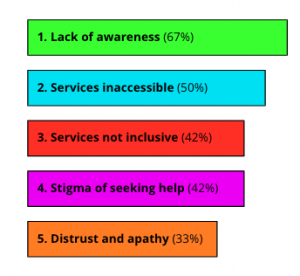
1. Lack of awareness
The largest barrier young people faced when accessing support was a lack of awareness that services even existed that could support them. Many of them only found about services that could have benefited them years after their loss.
“I only realised at 18 there was a school counsellor” Nadia, bereaved age 11
“I only found out about bereavement counselling a month ago” Layla, bereaved age 17
A lack of signposting led many young people to seek out support themselves or simply deal with their bereavement in their own way.
“There’s a lack of information of where to go, I only looked up the ones my friends recommended” Sofia, bereaved age 21
2. Services inaccessible
Most services require you to fit certain criteria to qualify for support. Barriers such as the area young people are from, waiting lists and costs of services were all highlighted during the research.
“Services only available in certain boroughs, it’s a postcode lottery” Rebecca, bereaved age 16
“Some young people struggle to express themselves when they’re getting assessed for support” Rebecca, bereaved age 16
“It took a bit of a while and that’s with wanting to receive a proper therapy session as a young person” Eunice, bereaved age 13
3. Services not inclusive
Participants felt that talking therapies do not work for all young people as many struggle to express their emotions. This also makes it difficult for many young people to access the support they need as assessments are generally done through a discussion with a practitioner.
“Some young people struggle to express themselves when they’re getting assessed for support” Rebecca, bereaved age 16
Cultural competency also came up as a barrier for many young people alongside young people not being able to relate to practitioners.
“I really struggled with counselling support. It comes down to the person delivering it, they couldn’t relate to me. The therapist was crying and made me feel uncomfortable” Rebecca, bereaved age 16
4. Stigma of seeking help
For many communities there is still a stigma attached to seeking support and this stopped many people reaching out for help.
“In ethnically populated areas, you’re made to accept it. You see people go to jail, you see people die. There’s not a lot of support for the people left behind” Khalil, bereaved age 14
“Very taboo subject with family, they wouldn’t understand unless they’re the same age group” Amit, bereaved age 19
Some of the young people also talked about how the experience of bereavement can be very different for young men compared to young women.
“Us girls, we were very open. My guy friends didn’t do it as much” Sofia, bereaved age 21
“Encouraged to grieve ‘in the right way’ and then get on with it” Khalil, bereaved age 14
5. Distrust and apathy
Many young people that had previous experiences of statutory services already felt a sense of distrust with services being offered to them.
“My care experience wasn’t great, I was moved around so my view of services isn’t good. I have a distrust in services and I wouldn’t have accepted them even if offered” Rebecca, bereaved age 16
Word of mouth is important when young people are seeking out services and their peers negative experiences can lead them to not seek out support.
“Their negative experiences turned me off, ‘you can try it, but they’re not much good‘” Sofia, bereaved age 21
Opportunity Areas
Using our barriers to accessing support services, we have five opportunity areas we can respond to, to improve bereavement services for young people affected by violence.
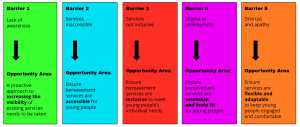
Trauma-Informed Practice
It is important to ensure that the six principles of trauma- informed practice are embedded into any future service provision.
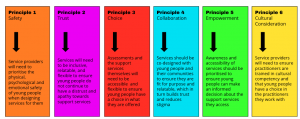
Three: Improving bereavement services
Now that we have understood the barriers affecting young people’s access to services and identified the opportunity areas for change, it’s time to centre their ideas.
IMPROVING SERVICES
Young people’s ideas for how bereavement services can be improved
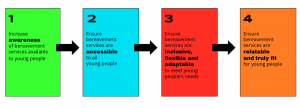
1. Increase Awareness
“There needs to be more openness of information, it shouldn’t just be word of mouth. Need to promote it more widely. Not just MIND should come to mind”
What’s clear from the research is that the necessary bereavement information isn’t getting through to the people that need it most. Increasing the awareness of existing services available to young people should be the top priority when looking at ways to improve support services.
Information needs to be made available to young people in the places where they spend their time to ensure as much exposure as possible. Word of mouth remains important, particularly for peer to peer recommendations, but we need to go beyond this to ensure all young people are made aware of the services available to them and that they can make an informed decision.
A proactive approach to increasing the visibility of existing services needs to be taken.
Recommendations
- Promote services through posters and leaflet drops in places where young people are, such as youth clubs, community centres, local libraries, faith groups, schools, colleges and universities
- Promote services in places where vulnerable young people are, such as GP surgeries, hospitals, and pharmacies so they can see other services on offer to them e.g. signs for Samaritans in an anger management class
- Promote services on social media where there’s a youth audience, in particular Instagram and TikTok
- Run advertising campaigns on social platforms such as YouTube, TikTok and Instagram
- Work with ambassadors to increase awareness of and engagement with services. An example of best practice is the success of Marcus Rashford’s free school meals campaign
- Utilise ‘out of home’ (OOH) advertising such as on the tube, on buses, at bus stops and on billboards
2. Accessible Services
“Oftentimes, it’s only immediate family that can access services. Strong relationships should be seen as family. I was the family of my friend that was murdered and I didn’t receive any support”
To ensure young people are able to access the support they need in the time after their bereavement, services need to be accessible, flexible and adaptable to the needs of each individual young person.
Currently the borough in which a young person lives is a huge determinant in which services they can access resulting in a type of ‘postcode lottery’. Removing these barriers to accessing support in the first place and providing universal offerings are key to ensuring an uptake in services and young people being provided with the support they need.
Recommendations
- Diversify assessments to ensure a thorough understanding of the young person’s background and context is considered when deciding on service options for them
- Provide options and choice for young people to ensure they can find support that works for them
- “Many young people struggle over the phone” Rebecca, bereaved age 16
- Advocate for young people to ensure they are fast tracked and avoid long waiting lists
- “Need to advocate for young people, makes a huge difference like getting seen faster” Rebecca, bereaved age 16
- If long waiting lists are unavoidable, ensure there is an interim solution put in place to support that young person
- Provide actual safe spaces where information isn’t shared, unless for safeguarding reasons
- “I found out what I was saying in counselling was being fed back to my parents. At the time I wasn’t aware it was a breach” Sarah, bereaved age 12
3. Inclusive Services
“Services need to be more inclusive and have options – there needs to be practical and visual options, not just talking”
Providing young people with options and choice is key to ensure an uptake in services and reducing feelings of apathy or distrust.
Although most of the young people spoke about how beneficial counselling was, or could have been, for them, it’s important to remember that this might not be the solution for every young person.
Additionally, counselling alone is not always enough support for all young people with many of them mentioning a mixture of both one to one support and group activities as the most beneficial way of getting them through their bereavement.
Recommendations
- Co- design services with young people to ensure they aren’t just an altered version of adults services that don’t serve their needs
- “Young people need to be involved in the process so its suitable. Depending on age, needs to be appropriate and not generic, need to truly understand that young person” Jade, bereaved age 12
- Take a creative approach to services to ensure young people aren’t just offered talking therapy
- “There needs to be out of the box things like music, drawing, boxing, theatre” Rebecca, bereaved age 16
- Provide young people with the option to engage in group activities with their peers as well as one to one support
- “Group therapy with my friends would be amazing – would encourage trust and vulnerability” Sofia, bereaved age 21
- Build a support network around each young people so they don’t feel alone
- “I was feeling very lonely, it would have been nice to have a support network. I didn’t have many friends because I was new to the country” Usman, bereaved age 8
4. Relatable Services
“It’s very alien explaining your story to someone that doesn’t have that lived experience”
Ensuring services are relatable for every young person that engages with them is key to ensure they feel listened to and understood during their grieving process.
Whilst characteristics such as age, gender, ethnicity, and lived experience were all mentioned as important considerations when choosing a practitioner they would like to work with, many young people didn’t necessarily have a requirement for their practitioner to reflect themselves.
Services need to take an interest and want to understand young people’s position, including their background and how it impacts their view of the world.
“Someone that is genuine. You kind of know, you can feel if you’re emotionally distant to them. You know if someone goes out of their way for you” Sofia, bereaved age 21
Recommendations
- Empower communities to support each other through engagement, collaboration and training
- “It’s not necessarily about race. We’re all from the same hub, all from the same place. It needs to be someone really from here and really understands the culture [of the estate]” Khalil, bereaved age 14
- “Older people around could have done better to be role models to support young people in the community” Khalil, bereaved age 14
- Respect cultural norms and understand cultural nuance by providing practitioners with cultural competency training and invest in diversifying the profession
- “In Tamil culture – we have cremations rather than burials. Religion is very important. Therapists need to understand and have an awareness of how our culture grieves” Usman, bereaved age 8
- Match each young person to a practitioner that they feel comfortable with and understands them, giving them the choice to change if they want to
- “Where they’re from, what class they are – especially when it comes to violence – that’s important” Sofia, bereaved age 21
- “It’s less the age thing and more of the thing about understanding” Khalil, bereaved age 14
- Provide young people with a mentor that they trust and can lean on for support
- “Talking to someone that has been through the same thing, someone my age to understand how they got through it and moved on” Amit, bereaved age 19
- “Taking away stigma of men expressing themselves” Rebecca, bereaved age 16
“You can feel guilty if a friend passes and
you feel bad for living, or say partying.
You still have to live your life”